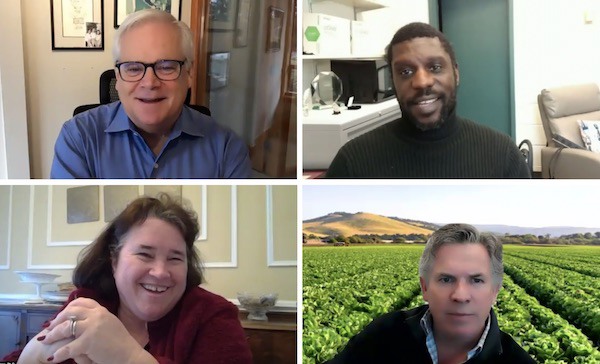This week’s PMA virtual town hall took a look at how food safety problems and possible solutions might continue to evolve in the new year. The panel was led by Max Teplitski, PMA’s Chief Science Officer. Panelists were Wendelyn Jones, Ph.D., Executive Director of ILSI North America, William D. Marler, Esq., a food safety attorney, Lawrence Goodridge, Director of the Canadian Research Institute for Food Safety and Drew McDonald, the Vice President for Food Safety and Quality at Taylor Farms.

Expectations for 2021
The panel discussion was kicked off by a discussion on what vulnerabilities might be apparent in produce safety in 2021 and how these vulnerabilities might be addressed. Marler says: “Going in 2021, we will still be dealing with the same challenge as always: how do you grow a ready-to-eat product in an open environment and work around environmental contamination? I think the next big challenge for the industry will be that of land use.”
For McDonald, the main challenge in the future will be to continue to work on improvements: “The simple response is that we are vulnerable when we are complacent. We need to continue asking questions because there’s a tendency to generalize and speculate about food safety. Given the amount of work that has already been done in this field, there is a lot of existing knowledge and data available that we need to use. We need to continue to be curious and dig into the details,” he says.
Dr. Goodridge agrees, adding that especially within the area of leafy greens, research needs to look at the prevalence of Romaine lettuce in food safety outbreaks. “The first step is to actually confirm that Romaine lettuce is at the root of these outbreaks, and if that proves to be true then we need to look at why this is so often the case before we can even begin to think about solutions. There is a lot of new technology available that can be used to prevent or minimize outbreaks but it’s also important to keep in mind that there are costs associated with implementing new technology, and that we need to find a good balance between increasing safety and keeping the costs from increasing too much,” Goodridge says.
Dr. Jones believes that the pandemic will continue to cause uncertainty in 2021 and this will have an impact – though she also foresees a more positive effect: “With the development of the vaccine for the virus, I think the public has found a renewed trust in science and people will be more open to technology-based solutions in the future. We are going to see optimism as well as, hopefully, better collaboration between the different avenues of the scientific community,” she says.
The importance of testing
A large part of the discussion focused on the testing of products, and if this is a helpful strategy. “Testing a finished product is too little, too late,” says McDonald, “at this point, the problem already exists, and you can’t pinpoint where it is coming from. That doesn’t mean that testing isn’t important – it just needs to be used in the right way. We need to work to understand the entire process and place the testing in the right context. Tests should be done with the purpose of learning more and collecting data,” he adds. Marler agrees, saying: “Testing is one part of the equation, not the solution. We need to work on collecting data and applying it to the chain of production to make changes that will ultimately lead to negative tests.”
Whole genome sequencing
The introduction of whole genome sequencing (WGS) into the investigative process has been very helpful in many different avenues, though Dr. Goodridge does warn against overestimating its usefulness. “There will never be one single thing that can solve the entire problem, it will ultimately be a combination of different technologies. Even if WGS leads you to believe that a certain pathogen came from, for example, a certain animal, there would still be the need to verify this with other data and analyses in addition to the WGS,” he says. According to McDonald, the use of WGS will help the industry to use data and facts to work toward solutions. He says: “WGS isn’t the one and only answer, but it’s a tool to get to the answers. It won’t give us the answer, but it will help us to ask better questions.”
The new presidential administration and possible impacts
To close out the discussion, the panelists talked about what changes we might be able to expect with regard to food safety issues under the new administration. Marler says: “I expect to see something similar to what we saw under the Obama administration, especially as many of Biden’s appointees are mirroring the Obama administration. There will likely be incremental changes, but not huge shifts – especially as they’ll have their plates full with the Covid situation and its impact on the economy.”
“The good news is that food safety tends to be an apolitical issue, and everyone agrees that we need to reduce illness cause by food” McDonald adds. “There will be many opportunities for the new administration to continue to improve the process and create progress.”
As a final note, Dr. Jones shares: “The best practice for communication and data sharing and management is to recognize that each of the participants in the partnership will have different motivations and embrace this while simultaneously focusing on the commonality. It’s all about building trust, so let’s gather the existing data and work together on this issue – because food safety is one of those issues where we can all agree with each other.”
Next week’s virtual town hall will bring together a panel to explore issues and opportunities around diversity and inclusion in the industry.
